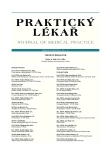Basics of social cognitive and affective neuroscience.
VIII. Political decision-making
Authors:
F. Koukolík
Authors‘ workplace:
Fakultní Thomayerova nemocnice s poliklinikou, Praha
; Oddělení patologie a molekulární medicíny
; Národní referenční laboratoř prionových chorob
; Primář: MUDr František Koukolík, DrSc.
Published in:
Prakt. Lék. 2011; 91(8): 443-447
Category:
Editorial
Overview
There are references and discussions about political decision making in the eldest literary sources. The development of social, cognitive and affective neuroscience has made it possible to describe the metaphorical “political brain”. Political cognition has some attributes in common with the procedural memory. One piece of evidence is an experiment by Westen’s group, which tested the neural bases of motivated reasoning. Elections are another object of intensive research interest:
– neural mechanisms of first impressions,
– neural basis for the effect of a candidate’s appearance on election outcomes,
– neural correlates of attitude change following positive and negative advertisements,
– spontaneous gestures during positive and negative speech,
– prediction of election outcomes from positive and negative trait assessments of candidate images,
– brain mechanisms of persuasion and expert influence, and
– evolutionary basis of attitude to decision makers are just some of the contemporary themes of “neuropolitics”.
Key words:
political decision, political brain, neuropolitics.
Sources
1. Bailenson, J.N., Garland, P., Iyengar, S. et al. Transformed facial similarity as a political cue: a preliminary investigation. Polit. Psychol. 2006, 27, p. 373-385.
2. Casananto, D. Embodiment of abstract concepts: good and bad in right - and left-handers. J. Exp. Psychol. Gen. 2009, 138, p. 351-367.
3. Casananto, D., Jasmin, K. Good and bad in the hands of politicians: spontaneous gestures during positive and negative speech. PLOS ONE 2010; 5(7). doi: 10.1371/journal.pone.0011805.
4. Coronel, J., Duff, M.C., Warren, D.E. et al. If citizens with severe brain lesion can make rational voting decisions, then so can everybody else. New faces in political metodology, quantitative social initiative. Pennsylvania State University: State college, PA, 2010.
5. Healy, A.J., Malhotra, N., Mo, C.H. Irrelevant effects affect voter’s evaluations of government performance. Proc. Natl. Acad. Sci. 2010, 107, p. 12804-12809.
6. Kato J., Ide, H., Kabashima, I. et al. Neural correlates of attitude change following positive and negative advertisements. Front. Behav. Neurosci. 2009, 3, p. 1-13.
7. Klucharev, V., Smidts, A., Fernández, G. Brain mechanisms of persuasion: how „expert power“ modulates memory and attitudes. SCAN 2008, 3, p. 353-366.
8. Koukolík, F., Drtilová, J. Vzpoura deprivantů. Nestvůry, nástroje, obrana. Praha: Galén, 2006, s. 117-118.
9. Koukolík, F. Mocenská posedlost. Praha: Karolinum, 2010.
10. Koukolík, F. Funkční systémy lidského mozku. Praha: Galén, 2011, s. 9 a dále.
11. Lieberman, M.D., Schreiber, D., Ochsner, K.N. Is political cognition like riding a bicycle? How cognitive neuroscience can inform research on political thinking. Polit. Psychol. 2003, 24, p. 681-704.
12. Mattes, K., Spezio, M., Kim, H. Predicting election outcomes from positive and negative trait assessment of candidate imaging. Polit. Psychol. 2010, 31, p. 41-58.
13. Olivola, Ch., Y., Todorov, A. Fooled by first impressions? Reexamining the diagnostic value of appearance-based inferences. J. Exp. Soc. Psychol. 2010, 46, p. 315-324.
14. Schiller, D., Freeman, J.B., Mitchell, J.P. et al. A neural mechanism of first impressions. Nat. Neurosci. 2009, 12, p. 508-514.
15. Simon, H.A. A mechanism for social selection and successful altruism. Science 1990, 250, p. 1665-1668.
16. Smith, K.B., Larimer, Ch.W., Littvay, L. et al. Evolutionary theory and political leadership. J. Polit. 2007, 69, p. 283-297.
17. Spezio, M.L., Rangel, A., Alvarez, R.M. et al. A neural basis for the effect of candidate apperarance on election outcomes. SCAN 2008, 3, p. 344-352.
18. Westen, D., Blagov, P.S, Harenski, K. et al. Neural bases of motivated reasoning: an fMRI study of emotional constraints on partisan political judgement in the 2004 U.S. presidential election. J. Cogn. Neurosci. 2006, 18, p. 1947-1958.
19. Wikipedie. Cognitive bias [on-line]. Dostupné na http://en.wikipedia.org/wiki/Cognitive_bias.
Labels
General practitioner for children and adolescents General practitioner for adultsArticle was published in
General Practitioner

2011 Issue 8
- Advances in the Treatment of Myasthenia Gravis on the Horizon
- Hope Awakens with Early Diagnosis of Parkinson's Disease Based on Skin Odor
- Memantine in Dementia Therapy – Current Findings and Possible Future Applications
- Memantine Eases Daily Life for Patients and Caregivers
- Possibilities of Using Metamizole in the Treatment of Acute Primary Headaches
-
All articles in this issue
- Osteopenia – a potential complication of phenylketonuria
- Study of four POCT systems for HbA1c measurement
- Short intervention and first aid for patients with addictive diseases
-
Basics of social cognitive and affective neuroscience.
VIII. Political decision-making - Problematic of doping in general practice
- What about a cup of coffee...
- Advances in operative treatment of fractures of upper and lower extremities
- Overactive bladder from the patient’s perspective
- Bioanalytical study of tumour markers for prostate carcinoma at RNA and protein level
- Resilience of family with handicapped child
- General Practitioner
- Journal archive
- Current issue
- About the journal
Most read in this issue
- Advances in operative treatment of fractures of upper and lower extremities
- Short intervention and first aid for patients with addictive diseases
- Study of four POCT systems for HbA1c measurement
- Problematic of doping in general practice
